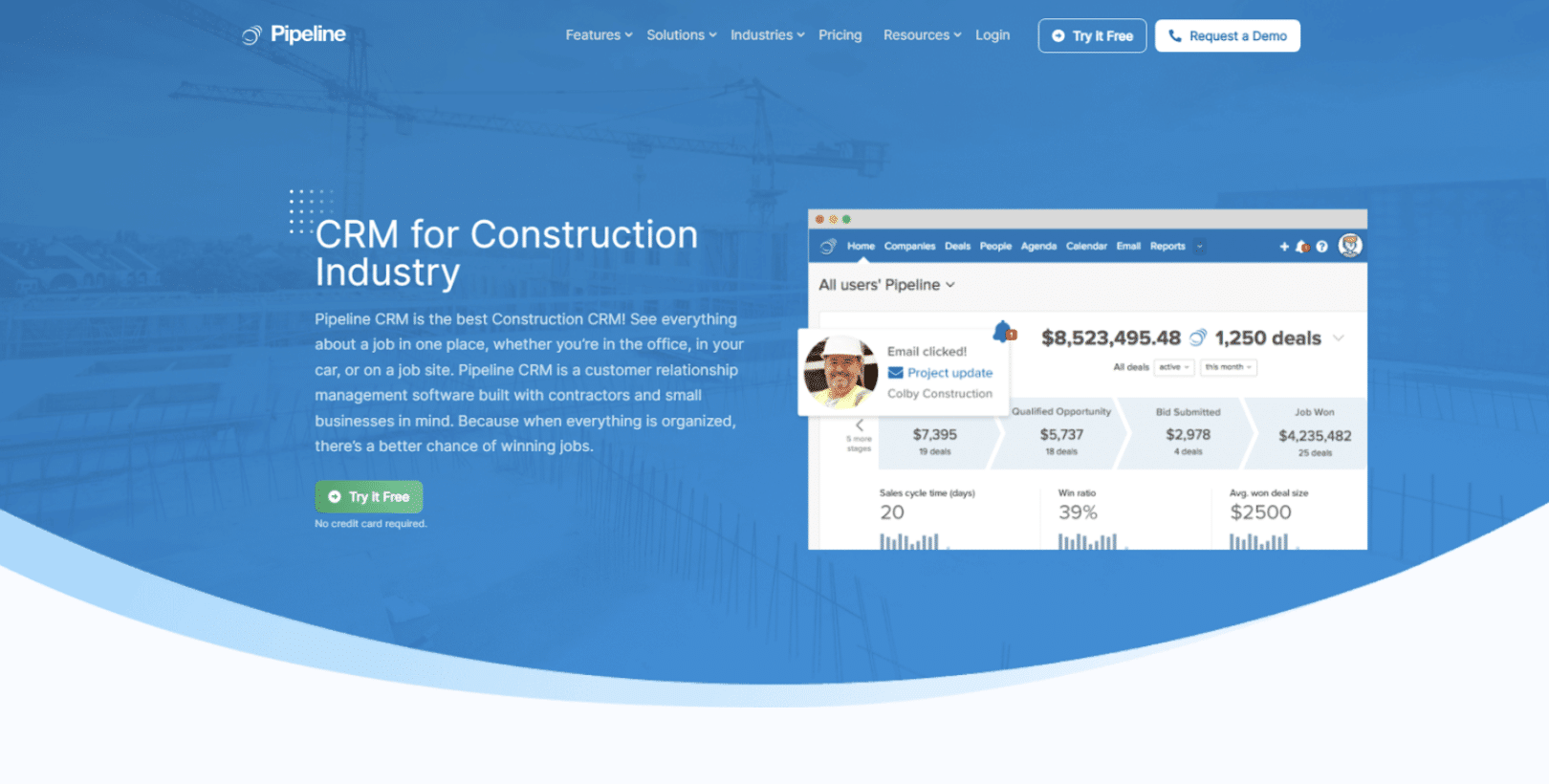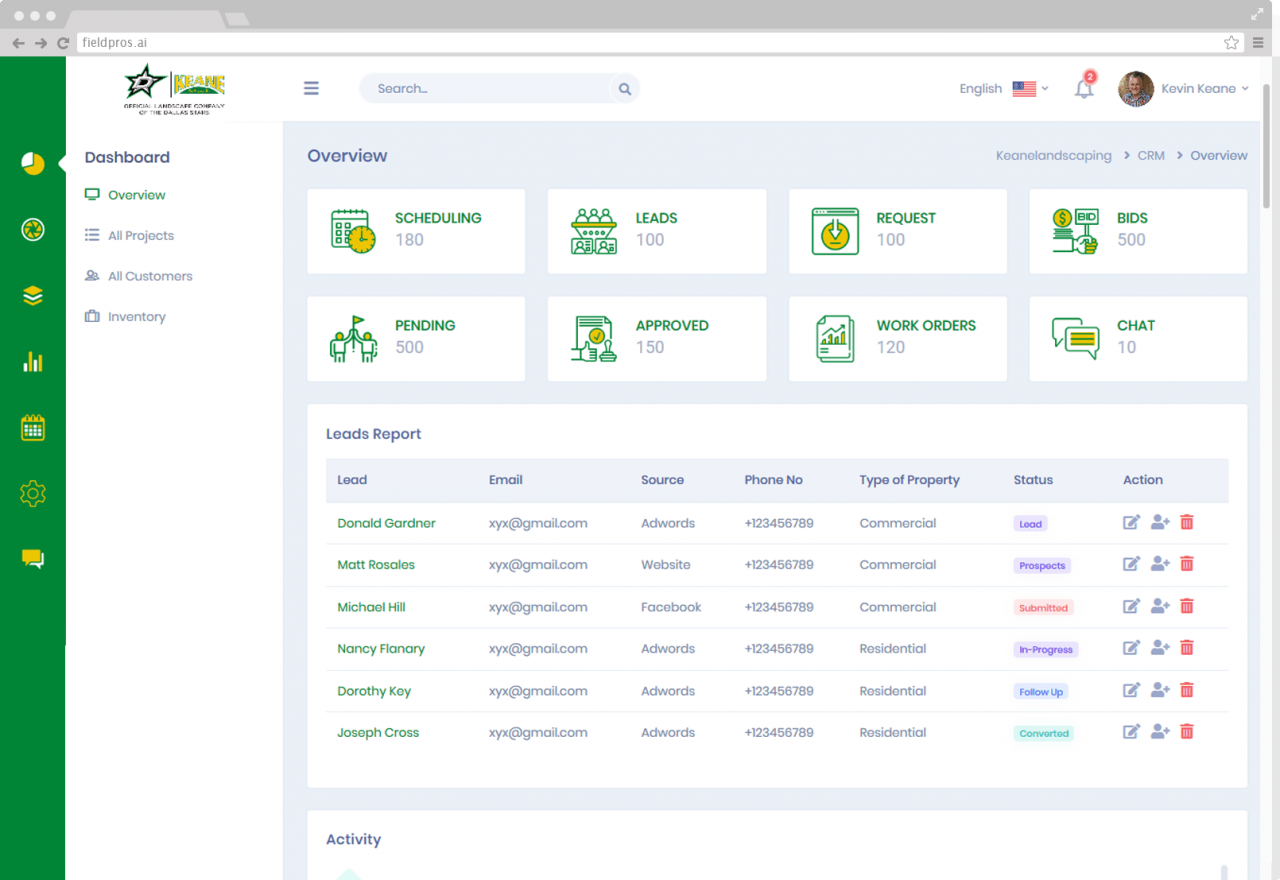Crm system for construction company – In the dynamic construction industry, a robust CRM system is indispensable for streamlining operations and fostering seamless collaboration. Discover how a CRM system tailored specifically for construction companies empowers businesses to manage customer relationships, streamline project management, and drive growth.
By integrating seamlessly with industry-specific software and providing comprehensive reporting and analytics, CRM systems offer a comprehensive solution for construction companies seeking to optimize their processes and gain a competitive edge.
Construction Industry-Specific Features
The CRM system is designed to meet the unique requirements of the construction industry. It includes industry-specific modules and functionalities that enhance construction workflows, such as project management, subcontractor collaboration, and equipment tracking.
The project management module allows construction companies to track the progress of their projects, manage budgets, and collaborate with team members. The subcontractor collaboration module helps construction companies to manage their relationships with subcontractors, track their performance, and ensure that they are meeting their contractual obligations.
Equipment Tracking
The equipment tracking module allows construction companies to track the location and usage of their equipment. This helps to ensure that equipment is being used efficiently and that it is not being stolen or lost.
Integration with Construction Software
In the dynamic construction industry, seamless integration between the CRM system and other essential software solutions is crucial for optimizing operations and enhancing productivity.
Integration with project management tools allows for real-time synchronization of project data, ensuring that the CRM system reflects the latest project status, resource allocation, and task dependencies. This eliminates manual data entry, reduces errors, and provides a comprehensive view of project progress.
Accounting Integration, Crm system for construction company
- Streamlines financial data flow, eliminating double entry and ensuring accurate billing and invoicing.
- Automates payment processing, reducing manual effort and improving cash flow.
- Provides real-time visibility into project profitability, enabling informed decision-making.
Document Management Integration
- Centralizes document storage, ensuring easy access to project-related documents, drawings, and contracts.
- Simplifies document sharing and collaboration, enhancing team efficiency.
- Automates document workflows, reducing manual tasks and improving document management processes.
Customer Relationship Management

The CRM system is designed to manage customer relationships effectively in the construction industry. It enables businesses to track interactions, manage leads, and nurture relationships with clients, subcontractors, and suppliers.
By centralizing customer data, the CRM system provides a comprehensive view of each customer’s history, preferences, and communication channels. This information helps businesses understand customer needs and tailor their interactions accordingly.
Lead Management
The CRM system helps businesses manage leads effectively. It provides tools for capturing lead information, qualifying leads, and assigning them to sales representatives. The system automates lead nurturing processes, such as sending personalized emails and scheduling follow-up calls, to increase conversion rates.
Customer Segmentation
The CRM system allows businesses to segment customers based on various criteria, such as industry, project size, and location. This segmentation enables businesses to target their marketing and sales efforts more effectively. By understanding the unique needs of each customer segment, businesses can tailor their communication and offerings to resonate better with their target audience.
Communication Tracking
The CRM system tracks all customer interactions, including phone calls, emails, and meetings. This information provides businesses with a complete history of their interactions with each customer, enabling them to identify patterns and improve communication strategies.
Collaboration and Workflow Management
The CRM system facilitates collaboration between sales, marketing, and project management teams. It provides tools for sharing customer information, managing tasks, and tracking project progress. This collaboration helps businesses streamline their processes and improve customer satisfaction.
Reporting and Analytics
The CRM system provides robust reporting and analytics capabilities. Businesses can generate reports on various metrics, such as lead conversion rates, customer lifetime value, and project profitability. This information helps businesses identify areas for improvement and make data-driven decisions.
Project Management
In the construction industry, effective project management is crucial for success. A robust CRM system empowers construction companies to streamline their project management processes, ensuring timely completion, budget adherence, and client satisfaction.
Through real-time project tracking, task management, seamless collaboration, and financial monitoring, the CRM system provides a centralized platform for project oversight and control.
Tracking Project Progress
- Monitor project milestones, timelines, and deliverables in real-time.
- Identify potential delays or bottlenecks early on.
- Adjust schedules and resources proactively to ensure timely completion.
Managing Tasks
- Assign tasks to team members and track their progress.
- Prioritize tasks based on urgency and importance.
- Communicate task updates and changes efficiently.
Collaborating with Team Members
- Facilitate seamless communication between project managers, contractors, and clients.
- Share project updates, documents, and plans in a centralized location.
- Track team member availability and workload.
Monitoring Project Financials
- Track project expenses, revenue, and profitability.
- Generate financial reports and forecasts.
- Identify cost overruns or areas for optimization.
Sales and Marketing Automation
The CRM system automates various sales and marketing processes, enabling construction companies to streamline their operations. It provides tools for generating leads, qualifying prospects, and managing sales pipelines, ensuring efficient and effective sales and marketing strategies.
Lead Generation
The CRM system integrates with lead generation channels such as websites, social media, and email marketing campaigns. It captures leads from these channels and stores their information in a centralized database. This enables sales teams to access a comprehensive list of potential customers and prioritize follow-up efforts.
Lead Qualification
The CRM system includes features for qualifying leads and identifying those most likely to convert into paying customers. It uses predefined criteria and scoring systems to evaluate leads based on factors such as industry, company size, and budget. This helps sales teams focus their efforts on the most promising prospects.
Sales Pipeline Management
The CRM system provides a visual representation of the sales pipeline, allowing sales teams to track the progress of each lead through different stages of the sales cycle. It enables them to identify bottlenecks, prioritize tasks, and forecast revenue based on the current pipeline.
Reporting and Analytics
The CRM system provides robust reporting and analytics capabilities that empower construction companies to gain deep insights into their sales performance, project profitability, and customer behavior. These insights enable data-driven decision-making, helping businesses optimize their operations and drive growth.
Reports and Dashboards
The system generates a wide range of reports and dashboards that provide valuable insights. These include:
- Sales performance reports:Track key sales metrics such as sales volume, revenue, and conversion rates, allowing businesses to identify trends and areas for improvement.
- Project profitability reports:Analyze project costs, expenses, and revenue to determine profitability and identify areas for optimization.
- Customer behavior reports:Understand customer preferences, buying patterns, and engagement levels, enabling businesses to tailor their marketing and sales strategies accordingly.
- Customizable dashboards:Create personalized dashboards that display the most relevant metrics and insights for specific roles or projects, providing a tailored view of critical information.
Key Performance Indicators (KPIs)
The CRM system tracks and measures key performance indicators (KPIs) that are specific to the construction industry. These KPIs include:
- Sales pipeline value:The total value of all active sales opportunities.
- Project completion rate:The percentage of projects completed on time and within budget.
- Customer satisfaction score:A measure of customer satisfaction based on feedback and surveys.
- Lead conversion rate:The percentage of leads that are converted into paying customers.
By monitoring these KPIs, construction companies can identify areas for improvement and make informed decisions to enhance their operations and achieve their business goals.
Mobile Accessibility: Crm System For Construction Company
![]()
In the dynamic construction industry, professionals are constantly on the move, overseeing multiple projects and interacting with various stakeholders. Mobile accessibility is crucial for construction professionals to stay connected and manage their responsibilities effectively.
Our CRM system recognizes this need and provides seamless mobile access to key features, empowering professionals to manage their projects and customer relationships from anywhere, at any time.
Key Features
- Project Updates:Stay informed about project progress, track milestones, and receive real-time notifications on mobile devices.
- Task Management:Assign tasks, set deadlines, and monitor progress on the go, ensuring timely completion and accountability.
- Customer Communication:Connect with clients, respond to inquiries, and schedule appointments directly from mobile devices, fostering seamless communication and building stronger relationships.
Security and Compliance
The CRM system prioritizes data security and compliance, implementing robust measures to protect sensitive construction industry data. It adheres to industry regulations and ensures data privacy.
Key security features include:
- Encryption:Data is encrypted at rest and in transit, safeguarding it from unauthorized access.
- Access Controls:Role-based access restricts data visibility and editing rights to authorized personnel only.
- Audit Trails:All user actions are logged, providing a comprehensive audit trail for compliance and accountability.
The CRM system is designed to meet industry-specific compliance requirements, such as:
- ISO 27001:International standard for information security management.
- GDPR:European Union’s General Data Protection Regulation for data privacy.
- HIPAA:Health Insurance Portability and Accountability Act for healthcare data protection.
By adhering to these regulations, the CRM system ensures that construction companies can confidently manage sensitive data, maintain compliance, and protect customer privacy.
Implementation and Training

Successful implementation of a CRM system is crucial for construction companies to maximize its benefits. The process involves careful planning, resource allocation, and comprehensive training to ensure effective adoption and utilization.
The implementation process typically begins with a thorough assessment of the company’s existing processes, data, and infrastructure. This helps determine the scope of the CRM system and its integration with other software applications. A dedicated project team is then established to oversee the implementation, including representatives from IT, sales, operations, and other relevant departments.
Training
Training is a critical component of successful CRM implementation. Construction companies should provide comprehensive training to all users, covering both the technical aspects of the system and its application to specific construction industry workflows. This training should be tailored to different user roles and responsibilities, ensuring that each individual understands how the CRM system can enhance their daily tasks.
Training programs should include hands-on exercises, simulations, and real-world scenarios to provide users with practical experience in using the CRM system. Regular refresher training sessions and ongoing support are also recommended to ensure continuous user proficiency and address any emerging issues.
Last Recap
In conclusion, a CRM system designed for construction companies is a transformative tool that empowers businesses to elevate their customer relationships, enhance project management capabilities, and streamline sales and marketing processes. With its industry-specific features, seamless integration, and robust reporting capabilities, a CRM system is the key to unlocking operational efficiency, driving growth, and achieving unparalleled success in the competitive construction landscape.
General Inquiries
What are the unique benefits of a CRM system for construction companies?
CRM systems tailored for construction companies offer industry-specific features such as project management modules, subcontractor collaboration tools, and equipment tracking capabilities, enhancing workflows and streamlining operations.
How does a CRM system integrate with other construction software?
CRM systems seamlessly integrate with project management tools, accounting systems, and document management solutions, ensuring smooth data flow, reducing manual effort, and improving overall efficiency.
How does a CRM system support customer relationship management in construction?
CRM systems enable construction companies to track interactions, manage leads, and nurture relationships with clients, subcontractors, and suppliers, fostering stronger and more profitable partnerships.
